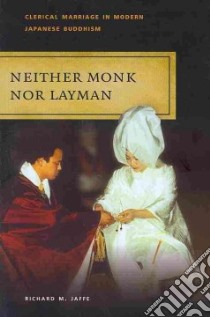Neither Monk Nor Layman - 9780824835279
Un libro in lingua di Jaffe Richard M. edito da Univ of Hawaii Pr, 2010
- € 24.20
- Il prezzo è variabile in funzione del cambio della valuta d’origine
"First-rate. Jaffe's research is utterly original; virtually none of the issues covered have been seriously investigated in any other Western-language study, and there are precious few Japanese secondary studies in the area. The book is well organized, well balanced, and a delight to read."---Robert Sharf, University of California, Berkeley
"That the male Buddhist clergy in Japan is almost entirely married is an anomaly within Buddhism as a whole. Jaffe's subject is the problem of how this came about. What were the implications for the Buddhist understandings of marriage, sexuality, and reproduction? What accounts for the fact that almost all Buddhist male clergy marry, while virtually no nuns do? What does `monasticism' mean in modern Japanese Buddhism? These are some of the questions animating Jaffe's study."---Helen Hardacre, Harvard University
Buddhism comes in many forms, but in Japan it stands apart from all the rest in one most striking way---the monks get married. In Neither Monk nor Layman, the most comprehensive study of this topic in any language, Richard Jaffe addresses the emergence of an openly married clergy as a momentous change in the history of modern Japanese Buddhism. He demonstrates, in clear and engaging prose, that this shift was not an easy one for Japanese Buddhists. Yet the trasformation that began in the early Meiji period (1868-1912)---when monks were ordered by government authorities to marry, to have children, and to eat meat---today extends to all the country's Buddhist denominations.
Jaffe traces the gradual acceptance of clerical marriage by Japanese Buddhists from the premodern emergence of the "clerical marriage problem" in the Edo period to its widespread practice by the start of World War II. In doing so he considers related issues such as the dissolution of clerical status and the growing domestication of Japanese temple life. This book will attract not only scholars of religion and of Japanese history, but all those interested in the encounter-conflict between regimes of modernization and religious institutions and the fate of celibate religious practices in the twentieth century
Informazioni bibliografiche
- Titolo del Libro in lingua: Neither Monk Nor Layman
- Sottotitolo: Clerical Marriage in Modern Japanese
- Lingua: English
- Autore: Jaffe Richard M.
- Editore: Univ of Hawaii Pr
- Collana: Univ of Hawaii Pr (Paperback)
- Data di Pubblicazione: 01 Novembre '10
- Genere: RELIGION
- Argomenti : Buddhist priests Marriage Japan Buddhist priests Family relationships Japan Marriage Religious aspects Buddhism
- Pagine: 288
- ISBN-10: 0824835271
- EAN-13: 9780824835279


